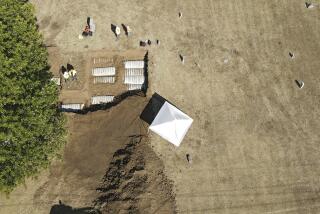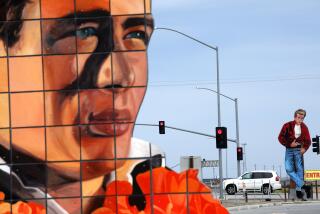Find Brings Closure for Dean
HOUSTON — Democratic presidential candidate Howard Dean confirmed Tuesday that a joint U.S.-Laotian task force has likely discovered the remains of his younger brother Charles, who was kidnapped and slain while traveling through Laos 29 years ago.
Dean, who journeyed to Southeast Asia last year to visit the site where it was believed his brother was killed, received the news several days ago. He and his two other brothers told their mother Monday night.
The discovery resurrects a painful chapter in the life of the former Vermont governor, who was 25 when his brother and an Australian friend, Neil Sharman, were captured during a trip through Laos in September 1974. After months of uncertainty, the Dean family learned from Asian contacts in mid-1975 that Charles Dean was probably dead, but they knew little about the circumstances until recently.
On Tuesday, Dean was uncharacteristically introspective about how the loss of his brother affected him.
“I never really had time to grieve; it’s very hard to grieve when you don’t have a body,” a somber Dean told reporters traveling with him on a plane from Bedford, N.H., to Houston.
But the loss of a brother made him “much more careful to tell people that I loved them when I did,” he said. “It made me more demonstrative about my emotions.”
Dean also said that his brother’s death was so traumatic that he had anxiety attacks in the early 1980s, which motivated him to seek therapy for about a year.
“When you go through something like this, you have a tremendous sense of survivor’s guilt and anger -- anger at the person who disappeared and then guilt over the anger,” he said.
Dean still wears a belt that belonged to Charles, and said his brother’s disappearance still haunted him.
“You always think about it,” he said. “That never goes away.”
Dean said that the items found at the site in Laos, a rice paddy a few miles from Vietnam, gave him confidence that his brother’s grave had been located.
“This experience is very hard for us, but it’s a good experience in the end ... because it does bring closure,” he said.
Pentagon officials said that they could not confirm that the remains were those of Dean’s brother until they could complete a forensic analysis of the bones and other items found at the site in Bolikhamxai Province in central Laos. The identification process could take months or years, depending on the condition of the remains, said Pentagon spokesman Larry Greer.
Along with substantial skeletal remains, investigators with the Pentagon’s Joint Task Force-Full Accounting -- which seeks to recover the bodies of Americans taken as prisoners of war and missing in action in Vietnam and other wars -- found a pair of shoes that resembled those worn by Charles Dean and a POW/MIA bracelet he wore to commemorate a soldier lost in Vietnam, Dean said.
“I believe it’s 99.9% [certain], given the effects they found at the site,” Dean said.
Just 16 months apart, Dean and his brother shared a bunk bed growing up in New York and then attended boarding school together in Rhode Island. They went to different colleges -- Howard to Yale, Charles to the University of North Carolina. During those years, they both moved to the political left, much to the disapproval of their staunchly Republican family.
Idealistic and gregarious, Charles Dean served as president of the student body at the University of North Carolina at Chapel Hill, and then went on to work as the county chair for Democrat George S. McGovern’s 1972 presidential bid.
McGovern’s sound defeat by President Nixon disillusioned and angered Charles Dean, who decided to head off on a backpacking trip to Asia.
His disappearance profoundly affected his older brother and reshaped his outlook on life, according to Irene Wielawski, one of nine journalists who contributed to a recently published book about Dean.
Howard Dean became more serious and pragmatic, according to Wielawski, who spoke with many of his friends who knew him at the time.
“It really halted his Yale-influenced liberal drift,” she said. “He snapped back to a much more of a centrist political view.”
At the time he was seized by Communist Laotian forces, Charles Dean was 24 years old and had been backpacking through Australia and Asia for about a year. During a trip down the Mekong River, he and Sharman were taken off a ferry and held by Communist forces in a dispute over a camera he was carrying, according to Howard Dean.
He was held in a local police camp for at least three months, and managed to have a photo of himself smuggled out. The photo eventually reached the U.S. Embassy in the Laotian capitol.
Howard Dean, who was living at home at the time, working as a stockbroker and taking night classes to prepare for medical school, got the phone call that his brother was captured. At the time, the family had not heard from Charles Dean in months and had been frantically trying to track him down.
“It was very worrisome, but at least we knew he was alive,” Dean said.
Through his father’s contacts with a group called the Asia Foundation, Dean said, the family received a letter in May 1975 that indicated Charles Dean was likely dead. The family held a private memorial service for him in Sag Harbor, N.Y., at a family cemetery.
They eventually learned that on Dec. 14, 1974, Dean and Sharman were handcuffed and transported from the camp in a truck. That was the last time they were reportedly seen alive.
Although he was a civilian, Charles Dean was classified as a POW/MIA. Howard Dean said that led to speculation that Charles was working for the CIA as a spy -- a report he said he discounted because of his brother’s strong antiwar views.
Howard Dean said he never asked the U.S. government why they classified his brother in a category typically reserved for missing soldiers.
Because of his status, the family received numerous intelligence briefings over the years as witnesses came forward. Reports indicated that when the two men were taken from the prison camp, they were driven north toward the Communist headquarters, a journey along a treacherous mountain path that goes through North Vietnam.
A few years ago, a witness told investigators that he saw the bodies of two young men tossed inside a bomb crater along that road near a bullet-riddled shack used by a North Vietnamese construction battalion.
During a trip to Laos in 2002, Dean visited the site, which had been graded over and turned into a rice paddy. He spoke to the witness, who said the North Vietnamese killed the two young men. Dean said he believed that report, but added, “we will never know that.”
The former governor said he and his family would travel to Hawaii on Nov. 26 for a repatriation ceremony.
*
Times staff writer Esther Schrader contributed to this report.
More to Read
Get the L.A. Times Politics newsletter
Deeply reported insights into legislation, politics and policy from Sacramento, Washington and beyond. In your inbox three times per week.
You may occasionally receive promotional content from the Los Angeles Times.










